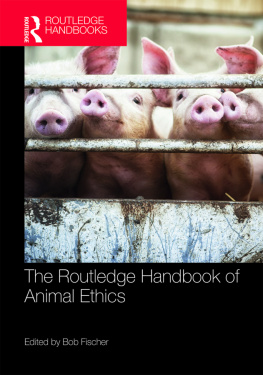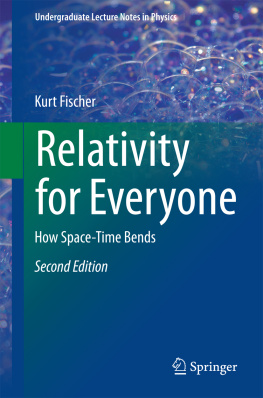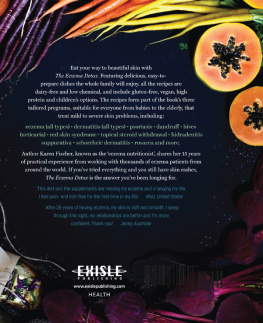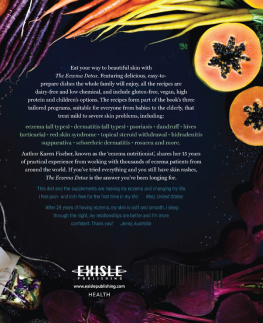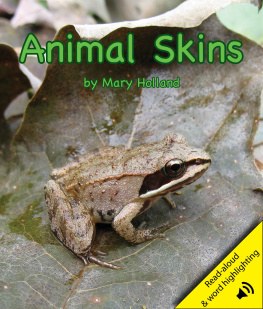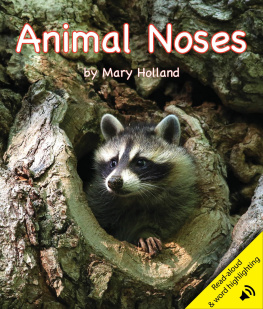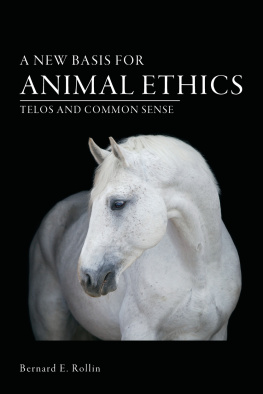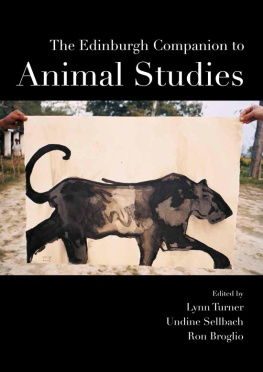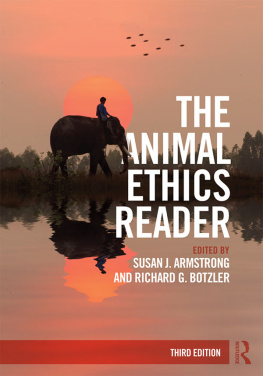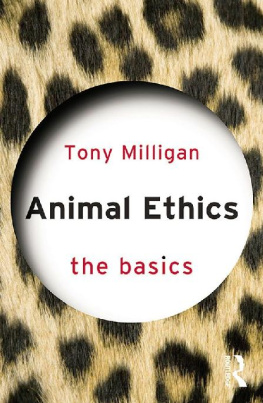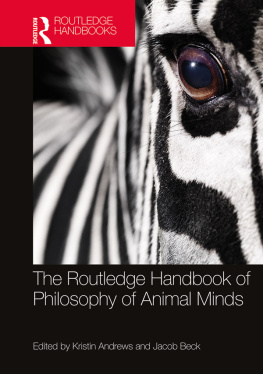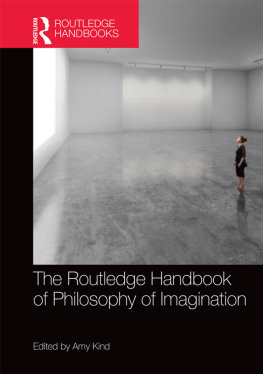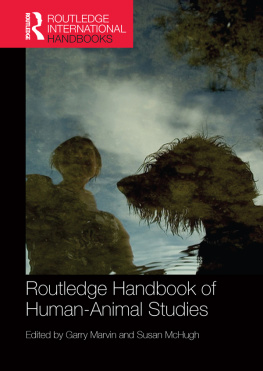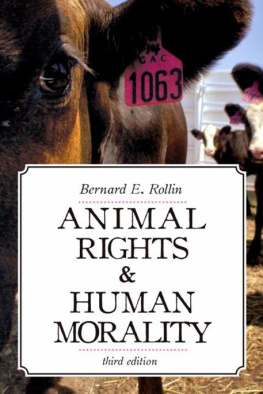The Routledge Handbook of Animal Ethics
There isnt one conversation about animal ethics. Instead, there are several important ones that are scattered across many disciplines. This volume both surveys the field of animal ethics and draws professional philosophers, graduate students, and undergraduates more deeply into the discussions that are happening outside of philosophy departments. To that end, the volume contains more nonphilosophers than philosophers, explicitly inviting scholars from other fieldssuch as animal science, ecology, economics, psychology, law, environmental science, and applied biology, among othersto bring their own disciplinary resources to bear on matters that affect animals.
The Routledge Handbook of Animal Ethics is composed of 44 chapters, all appearing in print here for the first time, and organized into the following six sections:
- Thinking About Animals
- Animal Agriculture and Hunting
- Animal Research and Genetic Engineering
- Companion Animals
- Wild Animals: Conservation, Management, and Ethics
- Animal Activism
The chapters are brief, and they have been written in a way that is accessible to serious undergraduate students, regardless of their field of study. The volume covers everything from animal cognition to the state of current fisheries, from genetic modification to intersection animal activism. It is a resource designed for anyone interested in the moral issues that emerge from human interactions with animals.
Bob Fischer is Associate Professor of Philosophy at Texas State University. He is the author of The Ethics of Eating Animals (Routledge, 2019) and Animal Ethics: A Contemporary Introduction (Routledge, 2020).
Routledge Handbooks in Applied Ethics
Applied ethics is one of the largest and most diverse fields in philosophy and is closely related to many other disciplines across the humanities, sciences and social sciences. Routledge Handbooks in Applied Ethics are state-of-the-art surveys of important and emerging topics in applied ethics, providing accessible yet thorough assessments of key fields, themes, thinkers, and recent developments in research.
All chapters for each volume are specially commissioned, and written by leading scholars in the field. Carefully edited and organized, Routledge Handbooks in Applied Ethics provide indispensable reference tools for students and researchers seeking a comprehensive overview of new and exciting topics in applied ethics and related disciplines. They are also valuable teaching resources as accompaniments to textbooks, anthologies, and research-orientated publications.
ALSO AVAILABLE:
The Routledge Handbook of Neuroethics
Edited by L. Syd M Johnson and Karen S. Rommelfanger
The Routledge Handbook of the Ethics of Discrimination
Edited by Kasper Lippert-Rasmussen
The Routledge Handbook of the Philosophy of Paternalism
Edited by Kalle Grill and Jason Hanna
The Routledge Handbook of the Ethics of Consent
Edited by Peter Schaber and Andreas Mller
The Routledge Handbook of Ethics and Public Policy
Edited by Annabelle Lever and Andrei Poama
The Routledge Handbook of Animal Ethics
Edited by Bob Fischer
For more information about this series, please visit: www.routledge.com/Routledge-Handbooks-in-Applied-Ethics/book-series/RHAE
The Routledge Handbook of Animal Ethics
Edited by Bob Fischer

First published 2020
by Routledge
52 Vanderbilt Avenue, New York, NY 10017
and by Routledge
2 Park Square, Milton Park, Abingdon, Oxon, OX14 4RN
Routledge is an imprint of the Taylor & Francis Group, an informa business
2020 Taylor & Francis
The right of Bob Fischer to be identified as the author of the editorial material, and of the authors for their individual chapters, has been asserted in accordance with sections 77 and 78 of the Copyright, Designs and Patents Act 1988.
All rights reserved. No part of this book may be reprinted or reproduced or utilised in any form or by any electronic, mechanical, or other means, now known or hereafter invented, including photocopying and recording, or in any information storage or retrieval system, without permission in writing from the publishers.
Trademark notice: Product or corporate names may be trademarks or registered trademarks, and are used only for identification and explanation without intent to infringe.
Library of Congress Cataloging-in-Publication Data
A catalog record for this book has been requested
ISBN: 978-1-138-09506-9 (hbk)
ISBN: 978-1-315-10584-0 (ebk)
Typeset in Bembo
by Apex CoVantage, LLC
Contents
PART I
Thinking About Animals
Catherine E. Amiot and Brock Bastian
Maria Botero
John M. Pearce
Kristina M. Horback
David DeGrazia
Mark Rowlands
Mark Budolfson and Dean Spears
Govind Persad
PART II
Animal Agriculture and Hunting
James McWilliams
F. Bailey Norwood
Joy A. Mench
Lisa Kemmerer
Jonathan Anomaly
Mimi E. Lam
Donald W. Bruckner
Raymond Anthony and Gary Varner
PART III
Animal Research and Genetic Engineering
Bernice Bovenkerk and Lonneke Poort
Pandora Pound
Larry Carbone
Adam Shriver
Ben J. Novak
PART IV
Companion Animals
Katherine C. Grier
Jessica du Toit
Jessica Pierce
Christine Overall
Shelby Elaine McDonald
PART V
Wild Animals: Conservation, Management, and Ethics
Markus Gusset
Nancy Staus
Karen S. Emmerman
Clare Palmer, Hamish Morrin, and Peter Sande
Sara Dubois
Tim S. Doherty and James C. Russell
Steven McMullen
Clare Palmer
Catia Faria and Oscar Horta
John Hadley
PART VI
Animal Activism
Janet M. Davis
Erin M. Evans
Nekeisha Alayna Alexis
Joanna Grossman
Jeff Sebo
Max Elder
Cheryl Abbate
Elan Abrell
Cheryl Abbate is Assistant Professor in the Philosophy Department at the University of Nevada, Las Vegas. She specializes in nonhuman animal ethics. Her publications include A Defense of Free-Roaming Cats from a Hedonist Account of Feline Well-Being in Acta Analytica (2019), How to Help when it Hurts: The Problem of Assisting Victims of Injustice in Journal of Social Philosophy (2016), and Adventures in Moral Consistency: How to Develop an Abortion Ethic from an Animal Rights Framework in Ethical Theory and Moral Practice (2015).
Elan Abrell is Senior Regulatory Specialist at The Good Food Institute and Visiting Assistant Professor in the Animal Studies Program at Wesleyan University. He is the author of many essays on animal sanctuaries.
Nekeisha Alayna Alexis is an independent scholar with wide-ranging interests in race/racism, human and animal oppression, intersectionality, co-liberation with other animals, and Christian ethics and theology concerning other animals. She is also Intercultural Competence and Undoing Racism coordinator at Anabaptist Mennonite Biblical Seminary in Elkhart, Indiana. She is involved in Vegan Michiana and organizing around other local social justice concerns.
Catherine E. Amiot is Full Professor of Psychology at the Universit du Qubec Montral. Her research is in the field of social psychology and humananimal relations. Her work has been funded by the Social Sciences and Humanities Research Council of Canada, the Australian Research Council, and the Qubec Funds for Research on Health and Culture.

